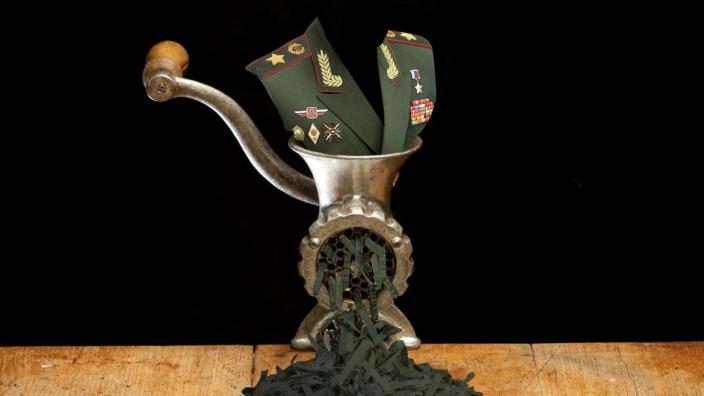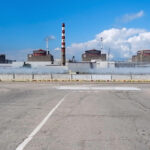
Russia has now lost at least 100 senior officers since it invaded Ukraine earlier this year, according to some tallies. It’s a devastating milestone for Moscow—and just the latest indication that Vladimir Putin’s war effort in Ukraine is wavering.
In the past two days alone, three senior Russian officers were reported dead: Lt. Colonel Nikolay Gorban, a commander from the Foreign Security Service (FSB) special forces; army aviation commander Colonel Vasily Kleshchenko; and Colonel Vitaly Tsikul of Russia’s 90th Tank Division—reportedly the 100th Russian senior officer to die in the war.
While exact tallies of Russian casualties can be difficult to pin down, a British intelligence analysis released this week found that at least 10 Russian generals have died on the battlefield since February.
But it’s not just deaths rankling Russia’s forces. Russia has been chipping away at its leadership ranks just by firing them outright, too. General-Colonel Aleksandr Chayko, the former commander of the Eastern Military District, was dismissed in May, according to British intelligence. Russia has likely replaced General-Colonel Aleksandr Zhuravlev with General-Lieutenant Vladimir Kochetkov to head up the Western Military District. General Aleksandr Dvornikov, who was heading up the operation in Ukraine, has also reportedly been dismissed.
The series of killings and firings could be an indication that Russia’s forces are still, nearly six months into the war, mismanaged from the inside out, according to Glen Howard, the president of the Jamestown Foundation.
Another General Killed as Russian Leak Admits ‘Big Shot Fucking Command’ Was Obliterated
“I see a lot of that was just kind of their own negligence, and sloppy generalship,” said Howard, who previously worked in the U.S. Embassy in Moscow.
The series of dismissals likely represents Moscow trying to find an approach that works for the war in Ukraine—but the continued hemorrhaging means President Putin probably just hasn’t figured it out yet.
“Putin is definitely adopting a strategy trying to find a fighting general that will succeed,” Howard said. “And luckily for us, he hasn’t found one yet.”
Russia’s military has struggled from the outset of the war to achieve key objectives. Russian troops failed to seize Kyiv, the capital, in the early days of the war, faltering instead outside of the capital due to a series of logistics failures. Putin had plans to install a Moscow-backed regime in Ukraine and take over the entire country, neither of which have come to pass. And troops have been abandoning and sabotaging equipment, according to reports from Ukrainian intelligence.
Putin’s trial-and-error approach has been prominent throughout the war, in part because Ukrainian forces have been so resistant to the invasion, applying pressure on the Russian forces so much they have to adapt their plans to meet Ukraine’s fight, according to the Pentagon.
“They have made some incremental gains in the east, although not very much in the last couple weeks, but that has come at extraordinary cost to the Russian military because of how well the Ukrainian military has performed and all the assistance that the Ukrainian military has gotten,” Colin Kahl, Biden’s undersecretary of defense for policy said in a Monday briefing. “And I think now, conditions in the east have essentially stabilized and the focus is really shifting to the south, and in part, that’s because the Ukrainians are starting to put some pressure down south and the Russians have been forced to redeploy their forces down there.”
All of that second-rate work is seeping into leadership circles, too; Russia’s military’s failures in the war have likely led to a series of dismissals of Russian leadership, according to British intelligence.
“The poor performance of Russia’s armed forces during its invasion of Ukraine has been costly for Russia’s military leadership, highly likely resulting in the dismissal of at least six Russian commanders since the start of hostilities in February 2022,” the intelligence report noted.
All of these losses are making Russia’s fighting force progressively less impressive, which could mean Russia is in for a grueling fight ahead.
“The war is taking a toll on them,” Howard said. “We faced their ‘A team,’ and now they don’t have any more reserved. The best of their best? We faced them and defeated them. Now we’re facing the ‘B Team.’ And so as they fight the ‘B team,’ they’re now moving into the ‘C Team.’ The quality level is just deteriorating.”
The diminished status of Russia’s forces will be welcome news for Ukrainians and Western nations, including the United States, as they continue to provide key military aid to Ukraine. In a war of attrition, with both sides intent on outlasting the other, both militaries are focused on grinding down the other military until they throw in the towel.
The significant losses Russia is suffering could place an increasing amount of pressure on Putin to either call it quits in Ukraine, or lean into kicking off a greater mobilization. So far, Putin has only admitted domestically that Russia is waging a “special military operation” in Ukraine, not an all-out war, and has been unwilling to kick off a larger mobilization.
And although the Russian forces have tried to recoup from their early failures in the war with a series of regroupings and change in approach, troops and leadership are still bearing some of the costs.
Russia has sustained between 70,000 and 80,000 casualties since February, according to a Department of Defense assessment shared Monday.
The Tricks Putin Is Cooking Up in His Mysterious War ‘Pause’
It’s “pretty remarkable considering that the Russians have achieved none of Vladimir Putin’s objectives at the beginning of the war,” Kahl said of the dwindling numbers.
That’s a significant jump from other U.S. government assessments in recent weeks. Just last month, CIA Director Bill Burns said the Russians had suffered about 60,000 casualties.
“The meat grinder continues,” Howard said. “There’s still a large number of people getting killed.”
And although dismissals and death are wrecking Putin’s forces, it doesn’t necessarily spell the end of the war or a Russian loss. According to the Department of Defense’s assessment, as of Monday, it’s not possible to say “with a high degree of certainty” at this stage how long Russia can sustain these levels of losses.
“A lot of it would depend, I think, on the political decisions that Vladimir Putin will make ultimately about whether he can continue to recruit and send additional forces to the front, whether he was at some point… willing to engage in national mobilization or some other effort,” Kahl said.
And already this week Putin has faced some embarrassing news. Explosions tore through a Russian air base on Tuesday in Crimea, which Russia illegally annexed in 2014. A Ukrainian military official claimed responsibility for the damage, suggesting that a long-range Ukrainian weapons system was used to launch the attack, according to The New York Times.
Get the Daily Beast’s biggest scoops and scandals delivered right to your inbox. Sign up now.
Stay informed and gain unlimited access to the Daily Beast’s unmatched reporting. Subscribe now.




